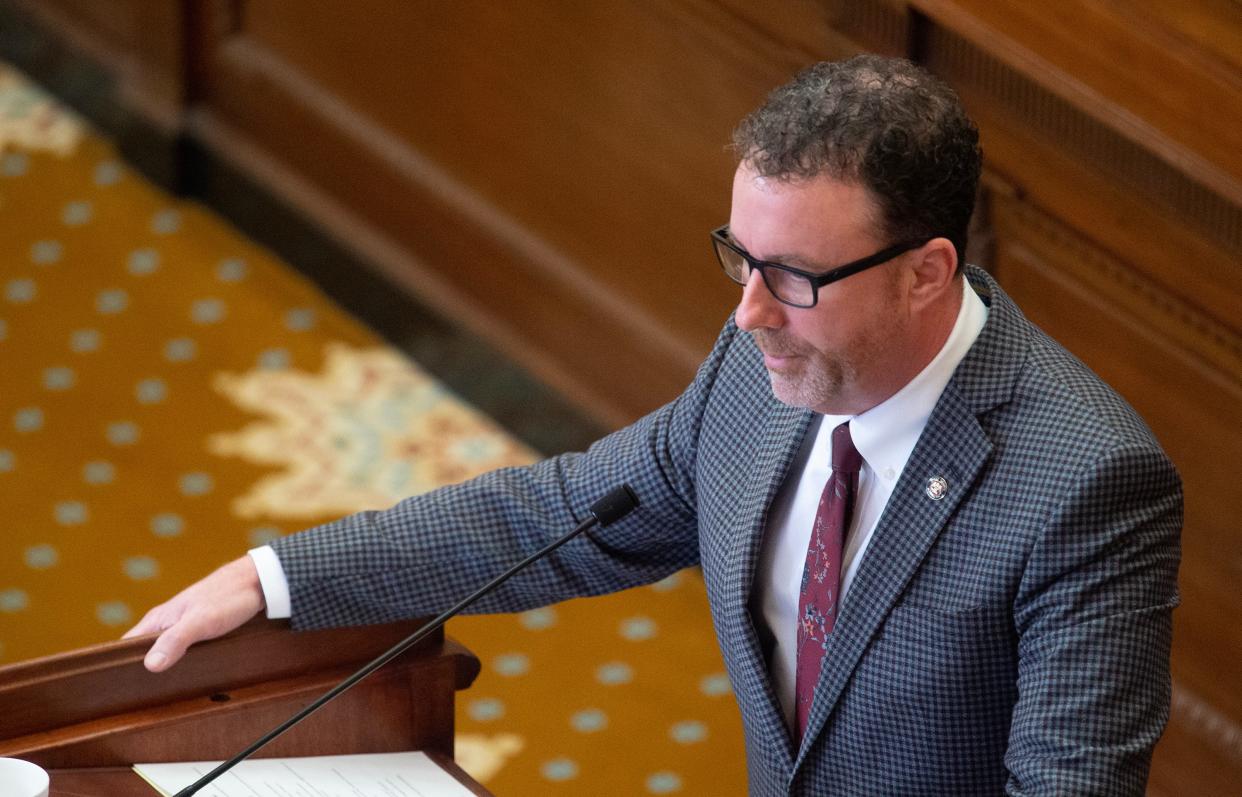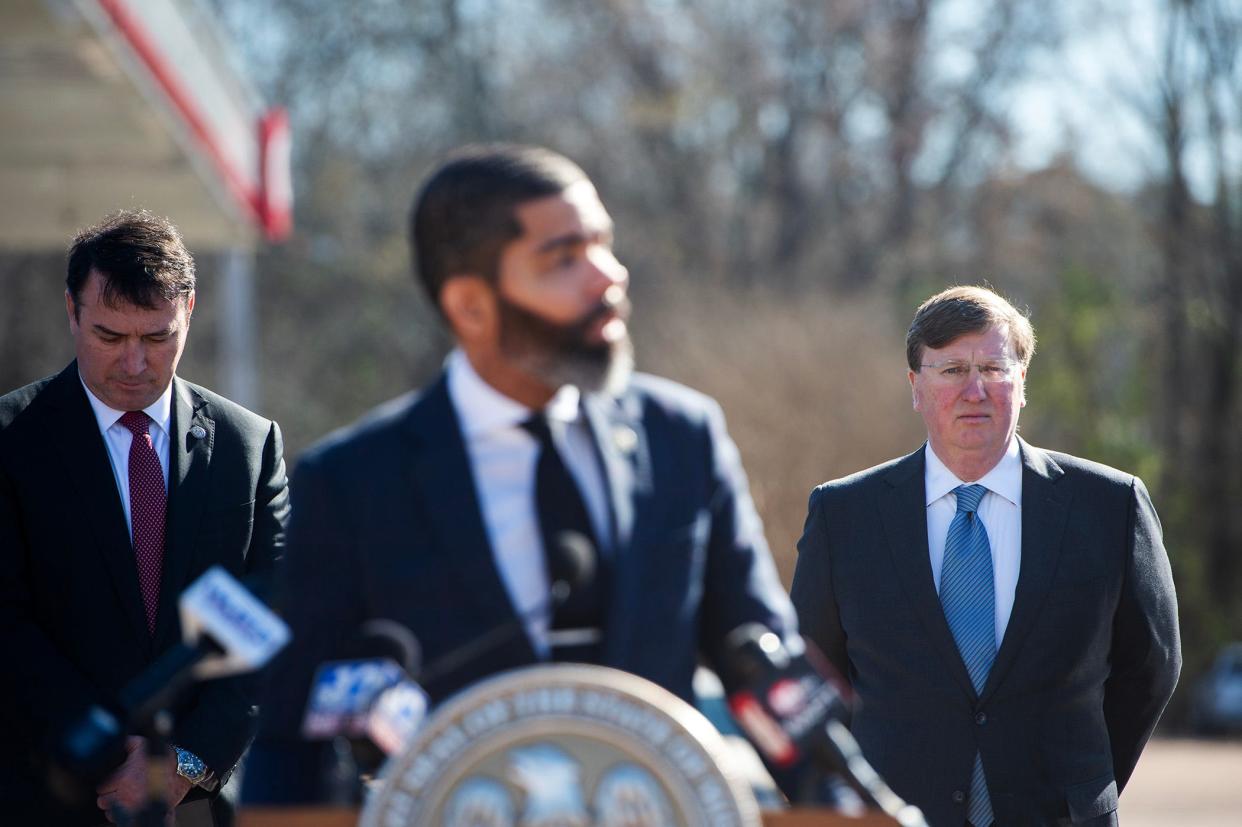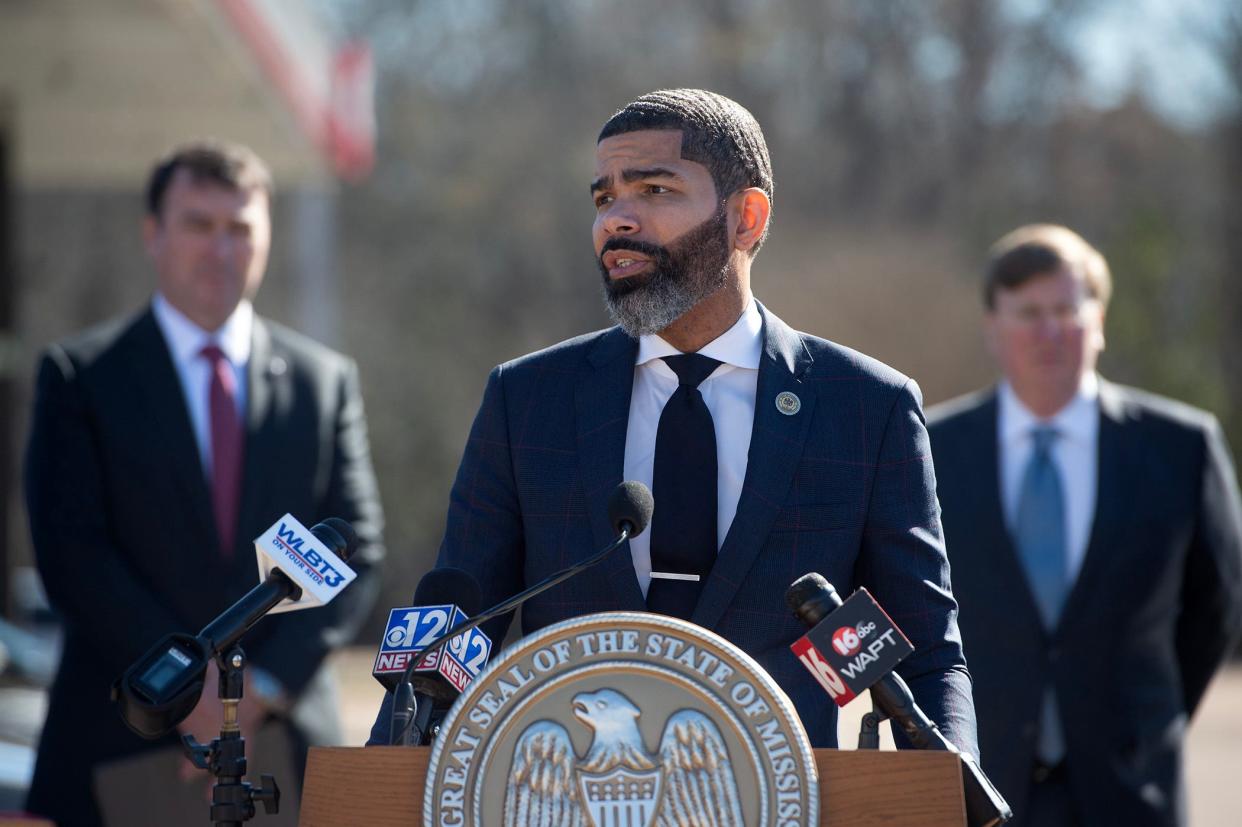City or State: Who is equipped to address Jackson's biggest issues? Depends on who you ask
If there’s only one thing state and local leaders seemingly agree on, it’s that Jackson needs solutions to various issues the city is facing.
Exactly how to go about solving the issues is the issue, and communication between area leaders and the state is practically non-existent.
Whether it’s warranted or not, the hand the Mississippi Legislature has played in the governance and development of Jackson remains a major point of contention between the majority-Black, Democratic local leadership and white Republican supermajority in the Capitol.
State lawmakers say their efforts to provide infrastructure improvements through the creation and expansion of the Capitol Complex Improvement District is a necessary step to attract more people to the city. Legislators also point to their attempts to regionalize the representation of the Jackson Municipal Airport Authority and hand the Jackson Water System over to a third-party nonprofit as beneficial for the city.
“I look at it in two different lenses,” Mississippi House Rep. Chris Bell, D-Jackson, said. “On one hand, I see where certain individuals are trying to make a difference and help the City of Jackson, which I appreciate. But on the other hand, it's the method in which they go about doing it without including the Hinds County or City of Jackson delegation. That has been my main concern. That’s the main problem.”

Some lawmakers think continued attention could only do more good for Jackson and its residents.
“I think the state would love to come alongside a partner with the City of Jackson in economic development opportunities," Sen, David Parker, R-Olive Branch, said. Parker has filed two bills so far to hand the Jackson Water System over to a mostly state-appointed nonprofit board. "I see a lot of real estate in this area that is just vacant, and I see just a lot of opportunity that has been missed. I think with a willingness to work together, I think there's certainly opportunity to move our capital city forward."
But most Jackson leaders have a different opinion on the matter. They view each of the “takeovers” as the state’s attempt to control various parts of the city’s biggest revenue generators, while also criticizing lawmakers for their lack of collaboration with city leaders.
“What we need is a state partner, not someone who is antagonistic to the things we’re trying to do,” said Jackson Mayor Chokwe Antar Lumumba in a phone interview on April 17. “You never see the state running to us saying, ‘Well, we want to aid you with these resources,’ … What you see is the state time and time again trying to syphon off those institutions that the city controls that are revenue generators.”

The Clarion Ledger spoke to more than a dozen sources to complete this report, representing both Republican and Democrat, state and local perspectives. Top Republican leadership within the Legislature did not grant full interviews or answer several questions related to the state's role in Jackson.
Lt. Gov Delbert Hosemann's office, which did not respond to several Clarion Ledger questions, had only this to say.
"The Capital City is critical to our state’s success and the state should have an active role in ensuring it thrives," Hosemann's Deputy Chief of Staff Leah Smith said.
First-year House Speaker Jason White, R-West, previously told the Clarion Ledger that Jackson represents the "epicenter of Mississippi," and the city deserved the Legislature's attention. With less than two weeks to go in the session, White is focusing on debates on key pieces of legislation. Jackson-specific legislation is not part of his stated priorities.
"The speaker is putting all of his attention and energy into the INSPIRE Act, access to healthcare for hardworking low-income Mississippians, and the long-term sustainability of PERS," White's Communications Director Taylor Spillman said.

Lumumba, on the other hand, didn't mince words about his thoughts on the state's actions.
"I think it's a paternalistic effort to run the City of Jackson," he said. "It is a cross section of differing ideologies — Jackson being a blue city in a red state. I think it has racial undertones — Jackson being a majority Black city … Any time there's effort or a discussion about doing anything for the City of Jackson there's a notion that we need oversight."
Jackson Municipal Airport Authority
In 2016, a federal lawsuit was filed after the Legislature passed Senate Bill 2162 and former Gov. Phil Bryant signed off on it. The bill aims to abolish the Jackson Municipal Airport Authority and the City of Jackson as the governing body over the Jackson-Wiley Medgar Evers International Airport and replace it with a regional authority consisting of city and state-appointed members from Jackson, along with Madison and Rankin counties.
Sen. Josh Harkins, R-Flowood, who wrote the airport bill, declined to comment specifically on how the new board would impact the City of Jackson, citing the case is still ongoing.
"It sits in the middle of my county I represent, so that was why I have an interest in it, and I have an interest in the success of it" Harkins said.

In early April, the U.S. Fifth Circuit Court of Appeals ruled the lawsuit as "moot" since the original five members of the JMAA Board of Commissioners who were named in the lawsuit are no longer members of the board. The lawsuit will now move back down to the United States District Court for the Southern District of Mississippi for a decision.
Lumumba shared a statement after the ruling, saying "the city will resume litigating the case along with the other plaintiffs."
Warren Herring, the chairman of the JMAA, told the Clarion Ledger that the board does not comment on pending litigation, "nor are we in a position to discuss other state actions."
Jackson Water System situation
Ward 4 Jackson City Councilman Brian Grizzell said he believes the fight over the airport is one of the reasons the state has pursued other "takeovers."
"A lot of this is a reactive response to the airport situation because we do not desire to comply with the state's wishes," Grizzell said. "These are our (the City of Jackson's) assets, and it seems like there's egregious misuse of power to take over our resources. They take those resources, they're going to drain us of everything, they're going to bankrupt us."
The airport bill is strikingly similar to Senate Bill 2628, which would create a third party to run Jackson's water system. Parker, the author of SB 2628, said he modeled the legislation after the airport bill, along with conversations he had with federally appointed third-party water administrator Ted Henifin, Lumumba and others.
More on Jackson water bills Bill to take over Jackson water system dies in MS House without a vote
The nonprofit would consist of a governing board made up of governor, lieutenant governor and city appointments comprised of local residents and rate payers from different occupational and cultural backgrounds.
Parker explained that any money the city receives from the nonprofit would have most likely come in financial conveyance, which is a transfer of funds that could total the commercial value of the water system. The city would also no longer receive any revenues collected from usage of the system.
It's important for a plan to be put in place for the water system once Henifin’s leadership in the water system is set to come to a close in 2027, Parker said.
Henifin was appointed by Judge Henry Wingate to lead JXN Water via a federal takeover after the system failed during the 2022 water crisis.
The Jackson City Council passed a resolution opposing Senate Bill 2628 back in March.
Unlike his colleagues, Ward 1 Councilman Ashby Foote said he would be open to sitting down with the lawmakers and hearing out their plans.
"We were losing our fanny on our water system. We had receivables of like $80 million depending on how many years you go back. That's money that we hadn't collected that we were due," Foote said. "We were not making money on our water system … To say, 'Oh, we're losing our source of revenue,' well revenue that doesn't meet your expenses is losses."
What is the CCID?
However, in years since, lawmakers have expanded the CCID boundaries to several areas north and east of downtown. Last year, lawmakers approved the expansion of the Capitol Police's jurisdiction to as far north as Northside Drive and as far south as Raymond Road, while also creating a new municipal court system within the CCID that goes into effect later this year.
Bell said the initial intent of the CCID was something that he himself ran on during campaign cycles, which was to improve Jackson's infrastructure.
However, the CCID has not expanded to areas that need more work, and lawmakers are again looking to expand the boundaries. That bill was waiting on lawmakers to iron out a compromise in conference as of April 18.
"I ran on creating a capital city complex, which has turned into a Frankenstein. It's a monster now," Bell said. "The Republicans took over that bill, ran with it and created this CCID. Now it's morphed into a monster."
Members of Republican leadership disagree with those sentiments.
Both Parker and Harkins said the Legislature acted within its bounds on the issue of policing the capital properly and providing funds to improve infrastructure in Jackson.
"I've always seen the Capitol Police as a whole as being a partner with the other law enforcement agencies," Parker said. "I don't see CCID policing being a complete and total responsibility of the Capitol Police right now. I see it as being another kind of partner to come along with Jackson Police Department and the Hinds County Sheriff's Office to make everyone happy and feel a little bit safer."
"The policing that we've done has been successful," Harkins said "The city was simply having issues with the police department. From the outside, that's what it looked like and there were staffing and all sorts of issues. The Legislature felt like things were not going very well at the city, and we couldn't get any cooperation, so we took matters into our own hands."
On the other hand, Lumumba defended the efforts of the Jackson Police Department during his interview. He also criticized the Capitol Police's jurisdiction expansion — set for July 1 — as only expanding into the city's largely white populated areas, and not other areas where the crime rate is higher.
Ward 3 Kenneth Stokes recently held a town hall where a majority of the residents in attendance, all but one was Black, voiced opposition to the expansion. Stokes himself criticized the Capitol Police for not making more of an effort to connect with the community.
"They (Capitol Police) need to come and meet and talk to people, give them that comfort zone," Stokes told the Clarion Ledger after the March town hall. "If this was a white ward and they called a meeting, they (Capitol Police) would be there. So why you can't come to Kenneth Stokes' ward?"
Some of the most controversial aspects of the CCID comes with the opening of the new municipal court later this year. While other judges in the Jackson area are elected or appointed by city leadership, this court will feature judge appointments from the Mississippi Supreme Court Justice Michael Randolph, and attorney appointments from Attorney General Lynn Fitch.
The author of the bill that established the CCID court is Rep. Trey Lamar, R-Senatobia. He did not respond to several requests for comments by press time.
More on CCID Court opening this summer 'It will be the most closely watched court in Mississippi.' Group to collect data on CCID
What's next?
When it comes to what areas of Jackson the Legislature could take on next, lawmakers that spoke to the Clarion Ledger did not disclose any specifics. Others who were asked did not respond to the question. Perhaps they didn't want to tip their hands of future plans. Perhaps they have no plans.
According to some people, the answer lies not in courts, police, borders or boards, but in education.
Douglas Carswell, president and chief executive officer of the Mississippi Center for Public Policy, who advises lawmakers on legislation, said lawmakers should either partner with the city or pay more attention to advancing public education and improving Jackson Public Schools.
"If we're serious about that, improving Jackson, we have to do something about the state of public education in Jackson," Carswell said. "I think creating charter schools would be a big step forward and possibly more magnet schools, too."
Looking at how the city and state partnered when it came to the takeover of Jackson Public Schools seven years ago could be a good example of how both entities can work together. In 2017, as the school district was on the verge of a state takeover, Lumumba and then-Gov. Phil Bryant came up with a compromise, announcing the formation of a state-and-city project commission tasked with adopting a plan for fixing the faltering then-27,000-student district.
The commission had 15 members. The governor, the City of Jackson, and the W.K. Kellogg Foundation each appointed five members — an equal amount — which differentiates from the water system bill and airport bill Republican lawmakers are in favor of. Those two bills give a majority of the power to the state when it comes to the number of appointees.
While you can't say the turnaround of JPS since 2017 is due solely to the commission, the school district has recovered from failing and on the brink of a state takeover to having a district grading of a C as of the 2022-2023 school year. The district has shown improvement under current Superintendent Errick Greene.
Out of the 44 Jackson Public Schools ranked, 16 earned an A rating, 12 earned a B, seven earned a C, five earned a D and four earned an F. The district recently announced it will close several buildings to right size what is now an 18,773-student district.
Education was the main solution for Carswell, but he also reflected on the creation of the CCID, saying that despite local opposition, those actions within Jackson have improved crime rates and allowed for more money to be funded into infrastructure projects.
Overall, Carswell said the success of the capital city is key for the success of Mississippi.
"It would be impossible to imagine the success for Tennessee without reference to Nashville," Carswell said. "It would be impossible to think about the success story of Arkansas in the past few years, without recognizing how a lot of Little Rock's problems have been fixed. The Alabama success story includes very much Huntsville but also fixing some of Birmingham's problems. If we're serious about improving Mississippi, we have to improve the capital."
However, Carswell said he understands why local leaders feel left out of the fold especially as appeals made to lawmakers for appropriations have largely been ignored by Republican leadership.
"I completely understand (Lumumba) is not going to want to be told how to run his city, by people who are not willing to help pay for him to do it, but, equally, said government is not going to want to just hand over money without some say," Carswell said. "So maybe, maybe there could be an agreement."
Grant McLaughlin covers state government for the Clarion Ledger. He can be reached at gmclaughlin@gannett.com or 972-571-2335.
Got story ideas? Want to talk about the issues facing the City of Jackson? Contact Charlie Drape at cdrape@gannett.com.
This article originally appeared on Mississippi Clarion Ledger: Jackson MS leaders, MS lawmakers at odds over path forward for city
